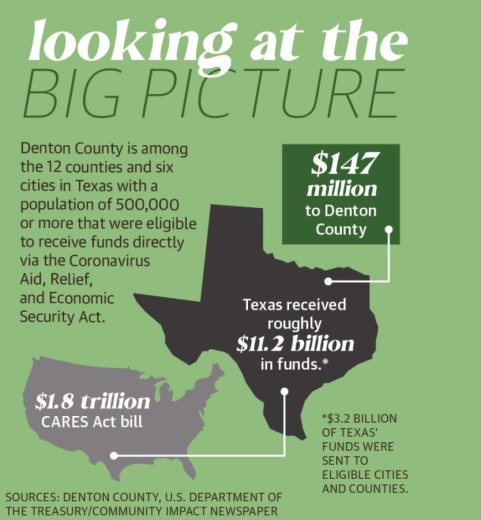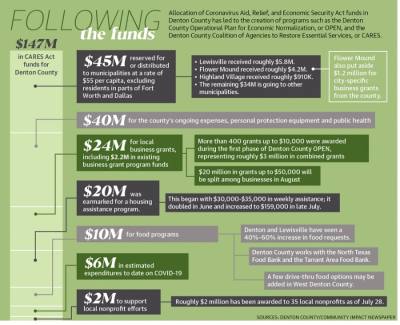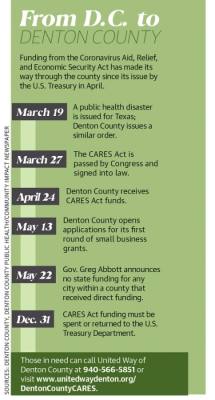The county focused these federal funds in areas of high-need, including housing assistance, food programs, local businesses and nonprofits, according to Dawn Cobb, county director of community relations. This funding must be spent by Dec. 31, she said.
Many have been helped so far, Cobb said, but the demand for assistance remains high.
“Here we are, four and a half months into [the pandemic],” Cobb said. “And it’s serious. And a lot of people have been affected.”
Securing housing
Denton County earmarked $20 million for one of its largest recognized needs: housing assistance. It then tapped United Way of Denton County to distribute those funds.
United Way used its own funds to assist with eviction prevention in March and April, but then shifted to distributing county funds, United Way CEO Gary Henderson said.
When CARES Act funds were introduced in early May, between $30,000- $35,000 in assistance from the county was handed out each week, Cobb said.
This amount doubled in June and then increased to roughly $159,000 for the week of July 20, according to Henderson.
“We know the volume of need is going to only increase throughout the summer and into the fall,” he said.
Supporting nonprofits
Lewisville-based nonprofit Christian Community Action, which also helps people in need, has seen record levels of requests for housing assistance since March, CEO Gilbert Montez said— largely in south Denton County.
The county set aside $2 million for nonprofit efforts and charged United Way with helping to distribute those funds through an online portal called Denton County Cares.
County Director of Administration Shannon Joski said officials are monitoring need so that if grant funds run low, the county can adjust its allocations. County officials do not anticipate running out of resources before the end of the year, she said.
However, some nonprofits fear that the need for assistance will carry over into the new year, Henderson said.
“2021 could be a very, very challenging year for the nonprofit organizations attempting to meet record level needs,” Henderson said.
Sustaining businesses
The county allotted $24 million in funds for small business grants.
More than 400 businesses received grants through the first phase of Denton County’s Operational Plan for Economic Normalization. Another $20 million is set to be awarded in August, Cobb said.
Jesse James, owner of Jesse Fit in Flower Mound and Outlaw Fitcamps in Hickory Creek, Little Elm and other locations around North Texas, said he received funding from the Paycheck Protection Program to help cover payroll but not rent.
After receiving roughly $8,000 from the first round of Denton County grants, he said he is hopeful that he will receive another grant to help with his biggest location in Flower Mound.
“We were shut down for two months,” he said. “That money helped out, ... [but] we’re still about 30%-38% behind on revenue intake.”
Allocating for cities
Based on guidance from the Office of the Texas Governor, Denton County also chose to distribute $45 million in CARES Act funding to its cities.
County officials decided to allocate $55 per person in each city, giving roughly $5.8 million to Lewisville, $4.2 million to Flower Mound and $910,000 to Highland Village.
Each city is allowed to use those funds for COVID-19-related expenses. At the end of May, new guidelines were released to allow cities to use that money on payroll for public safety and health employees as well, Joski said.
Flower Mound and Highland Village largely chose to use their funding for payroll expenses. Both municipalities also put portions of their funding toward public health and facilitating compliance, among other services, according to officials.
Flower Mound also set aside $1.2 million for business grants from the county, Deputy Town Manager Debra Wallace said.
Lewisville decided to allocate all of its funding to its existing public safety payroll, freeing up $5.8 million in its budget for unplanned expenses, City Manager Donna Barron said.
“We appreciate the CARES [Act] funding,” Barron said. “It will be of great assistance because ... we’ve had not only a significant reduction in our revenues, but unexpected expenses.”







